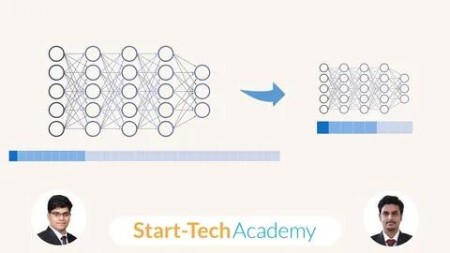Quantization For Genai Models

Quantization For Genai Models
Published 10/2024
MP4 | Video: h264, 1920x1080 | Audio: AAC, 44.1 KHz
Language: English | Size: 731.43 MB | Duration: 2h 34m
Unlock the power of model optimization! Learn how to apply quantization and make your GenAI models efficient with Python
What you'll learn
Understand model optimization techniques: Pruning, Distillation, and Quantization
Learn the basics of data types like FP32, FP16, BFloat16, and INT8
Master downcasting from FP32 to BF16 and FP32 to INT8
Learn the difference between symmetric and asymmetric quantization
Implement quantization techniques in Python with real examples
Apply quantization to make models more efficient and deployment-ready
Gain practical skills to optimize models for edge devices and resource-constrained environments
Requirements
Basic Python knowledge is recommended, but no prior AI experience is required.
Description
If you are a developer, data scientist, or machine learning enthusiast who wants to optimize and deploy efficient AI models, this course is for you. Do you want to make your models faster and more resource-efficient while maintaining performance? Are you looking to learn how to apply quantization techniques for better model deployment? This course will teach you how to implement practical quantization techniques, making your models lean and deployable on edge devices.In this course, you will:Learn the core concepts of Quantization, Pruning, and Distillation.Understand different data types like FP32, FP16, BFloat16, and INT8.Explore how to convert FP32 to BF16 and INT8 for efficient model compression.Implement symmetric and asymmetric quantization in Python with real-world applications.Understand how to downcast model parameters from FP32 to INT8 for deployment.Gain hands-on experience with Python-based quantization, making your models suitable for mobile and IoT devices.Why learn quantization? Quantization allows you to reduce the size and computational load of models, making them suitable for resource-constrained devices like smartphones, IoT devices, and embedded systems. By mastering quantization, you can ensure your models are faster, more energy-efficient, and easier to deploy while maintaining accuracy.Throughout the course, you'll learn to implement quantization techniques and optimize your models for real-world applications. This course provides the perfect balance of theory and practical application for making machine learning models more efficient.By the end of the course, you'll have a deep understanding of quantization, and the ability to optimize and deploy efficient models on edge devices. Ready to optimize your AI models for efficiency and performance? Enroll now and start your journey!
Overview
Section 1: Introduction
Lecture 1 Introduction
Section 2: Gen AI model optimisation techniques
Lecture 2 Introduction to Gen AI models
Lecture 3 Model optimisation techniques - Introduction
Lecture 4 Introduction to Pruning
Lecture 5 Introduction to Knowledge Distillation
Lecture 6 Introduction to Quantization
Section 3: Data Types and Number Representation
Lecture 7 Data Types and Number Representation
Lecture 8 Integer Data types
Lecture 9 Integer Data typesin PyTorch
Lecture 10 8-Bit Fixed-Point Numbers
Lecture 11 Floating-Point Numbers
Lecture 12 Other Floating-Point formats
Lecture 13 Floating Point data types in PyTorch
Lecture 14 Other formats
Section 4: Quantization
Lecture 15 Downcasting FP32 to BF16
Lecture 16 Downcasting of tensors in Python
Lecture 17 Downcasting of an ML model in Python
Lecture 18 Downcasting FP32 to INT8
Lecture 19 Symmetrics quantization
Lecture 20 Asymmetrics quantization
Lecture 21 GPT Neo 125 quantization
Beginners in machine learning looking to learn practical model optimization techniques like quantization,AI professionals and students wanting to optimize models for deployment on resource-constrained devices

FileAxa
RapidGator
FileStore
TurboBit
